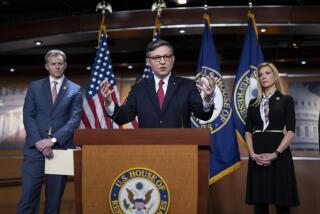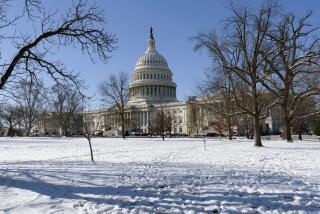Lump of Coal for the Jobless
Even Scrooge McDuck might be hard-pressed to think of something this mean: Although the lame-duck Congress came up last month with a $90-billion plan to bail out the insurance industry in the event of a new terrorist attack, it failed to reach agreement on a federally funded extension of temporary unemployment benefits.
As a result, almost a million unemployed Americans will have the House of Representatives and the White House to thank for seeing their benefits cut off three days after Christmas.
The temporary unemployment benefits extension, which has been in effect for less than a year, will start running out Dec. 28. The House approved a measly five-week extension for only a few states with the highest unemployment, and the Senate passed a broader 13-week plan. House Republican leaders said it was too expensive and refused to compromise.
It’s not as though the job market is recovering. The national 6% unemployment rate is unlikely to shrink in coming months, despite a bump last quarter in economic growth. Last week, the National Assn. for Business Economics predicted that the growth rate in the fourth quarter would drop to 1.4% annually, compared with 4% in the previous quarter.
Not only is helping the unemployed through a rough patch the right thing to do, it makes economic sense. Pumping in money that will be spent quickly on necessities stimulates the economy.
During the recession of the early 1990s, Congress passed a generous temporary program, regularly extended it and ended it only when it was clear that unemployment was declining.
Fiscally beleaguered states could dip into their tax-funded unemployment trust funds, which are not part of regular budgeting, to extend benefits state by state. Such a move, however, requires action by some state legislatures that will not be in session soon. The federal trust fund of more than $25 billion that exists to help the unemployed in hard times is what the government should be tapping into.
When the 108th Congress convenes Jan. 7, it has until Jan. 11 to pass a so-called continuing resolution to keep paying the government’s bills. It should include a temporary unemployment benefits program in the resolution.
For that to happen, President Bush and the House Republican leadership have to come on board. House Speaker J. Dennis Hastert (R-Ill.) and Rep. Bill Thomas (R-Bakersfield) have spearheaded the charge against extending benefits. They will continue to resist as long as the White House does not intervene. The president has yet to show his hand on extending benefits, but after Dec. 28 the scrutiny on him should intensify.
An extension of several weeks would do more good to the economy than harm to the burdened federal budget. And the benefit would be much swifter and surer than that of the misguided federal tax cuts.
More to Read
Get the L.A. Times Politics newsletter
Deeply reported insights into legislation, politics and policy from Sacramento, Washington and beyond. In your inbox three times per week.
You may occasionally receive promotional content from the Los Angeles Times.










